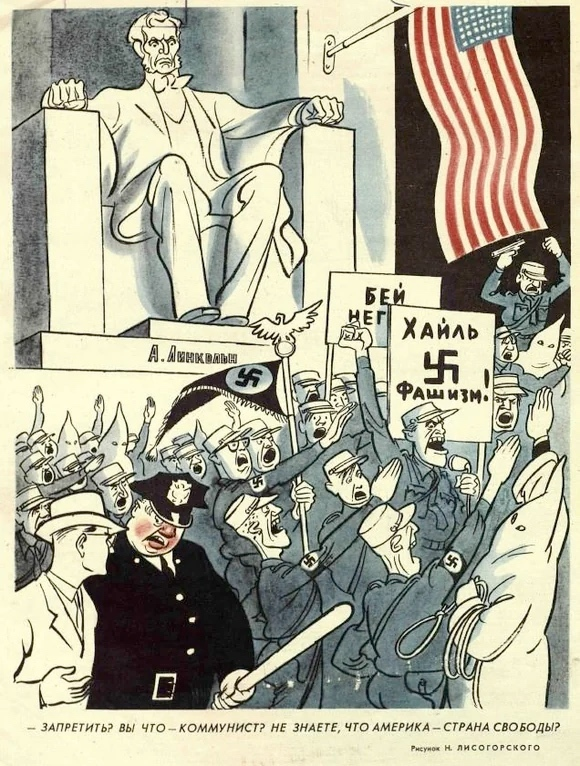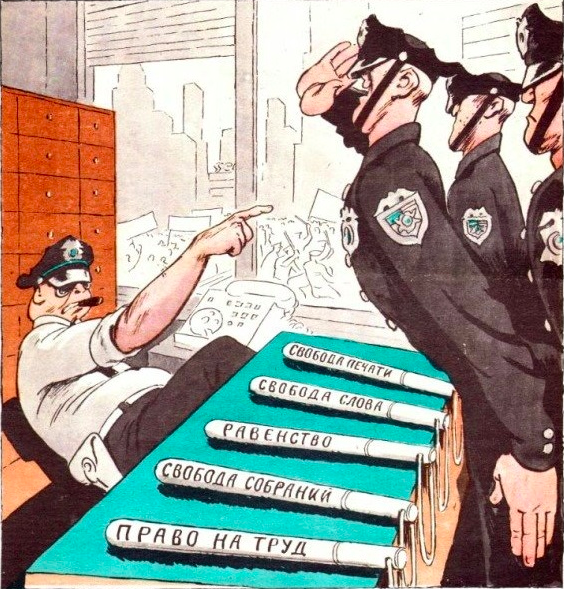More languages
More actions
(Mao quote) Tag: Visual edit |
No edit summary Tag: Visual edit |
||
| (4 intermediate revisions by 2 users not shown) | |||
| Line 1: | Line 1: | ||
[[File:USA free speech poster.png|thumb|Police: "Prevent? Are you a communist? Don't you know America is a country of freedom?" | [[File:USA free speech poster.png|thumb|Police: "Prevent? Are you a communist? Don't you know America is a country of freedom?" In the background, signs say "hail [[fascism]]" and "beat Neg—".]] | ||
[[File:Soviet poster about US police.png|thumb|Satirical [[Union of Soviet Socialist Republics (1922–1991)|Soviet]] poster showing Statesian [[police]] with batons labelled "freedom of speech" and other | [[File:Soviet poster about US police.png|thumb|Satirical [[Union of Soviet Socialist Republics (1922–1991)|Soviet]] poster showing Statesian [[police]] with batons labelled "freedom of speech" and other concepts such as equality or the right to work, mocking the way Statesians use "freedom of speech" and similar concepts in order to oppress the masses]] | ||
'''Freedom of speech''', like [[Free market|free markets]], is a [[Bourgeoisie|bourgeois]] [[idealism|idealist]] concept completely detached from reality. | |||
In theory, the concept posits that people have the right to express whatever they want. In reality, limits on publicly acceptable speech have always existed throughout human history, in both direct and indirect ways. | |||
== Under feudalism == | == Under feudalism == | ||
| Line 7: | Line 9: | ||
== Under capitalism == | == Under capitalism == | ||
In spite of the claims of [[Western]] governments that nominally constitutionally guarantee free speech, they do suppress freedom of speech. As these governments decide what narratives constitute as "[[Bourgeois media|mainstream]]", [[Anti-imperialism|alternative]] voices are portrayed as "fringe". | |||
=== In the United States === | |||
In 1938, the [[United States]] government established the [[House Committee on Un-American Activities]], to investigate communist "subversion" in the country. Individuals and organizations were persecuted and accused of "disloyalty". Victims of political persecution include civil rights activist [[Paul Robeson]] and Charlie Chaplin, who was accused of "communist sympathies" for his anti-war stance. The [[House Judiciary Committee]] has carried on the functions of HCUA since 1975.<ref>{{Web citation|author=Charles E. Schamel|newspaper=National Archives and Records Administration|title=Records of the House Un-American Activities Committee|date=July, 1995|url=https://archive.org/details/RecordsOfTheHouseUn-americanActivitiesCommittee-NaraFindingAid|retrieved=02/07/2024}}</ref> | |||
In recent times, [[police]] in the United States frequently raid press companies and harass reporters for challenging the Statesian [[MICIMATT]] system.<ref>{{Web citation|author=Steven Lee Myers and Benjamin Mullin|newspaper=New York Times|title=Raid of Small Kansas Newspaper Raises Free Press Concerns|date=2023-08-13|archive-url=Raid of Small Kansas Newspaper Raises Free Press Concerns|quote=The raid is one of several recent cases of local authorities taking aggressive actions against news organizations — some of which are part of a dwindling cohort left in their area to hold governments to account. And it fits a pattern of pressure being applied to local newsrooms. One recent example is the 2019 police raid of the home of Bryan Carmody, a freelance journalist in San Francisco, who was reporting on the death of Jeff Adachi, a longtime public defender.}}</ref><ref>{{Web citation|author=B|newspaper=Moon of Alabama|title="Exceedingly Rare"|date=2023-08-14|url=https://www.moonofalabama.org/2023/08/exceedingly-rare.html}}</ref> Notable examples of censorship include the cases of [[Edward Snowden]], [[Chelsea Manning]], and [[Julian Assange]]. | |||
In addition, social and financial pressure is often used as an indirect way to stifle free speech in the West. In 2006, the country band Dixie Chicks was censored and blacklisted for speaking out against [[George W. Bush]] and the [[Iraq War]].<ref>{{Web citation|newspaper=China Daily|title=NBC rejects TV ads for Dixie Chicks film|date=2006-10-29|url=https://www.chinadaily.com.cn/entertainment/2006-10/29/content_719231.htm|retrieved=30/06/2024}}</ref> | |||
== Under socialism == | == Under socialism == | ||
Article 125 of the [[Library:Constitution of the Union of Soviet Socialist Republics (1936)|1936 Constitution]] of the [[Union of Soviet Socialist Republics (1922–1991)|Soviet Union]] established freedom of speech, press, assembly, and protest for the [[Proletariat|working class]] and guaranteed these rights in practice by giving printing presses and paper to [[Proletariat|workers]] and their organizations.<ref>{{Citation|author=Eighth All-Union Congress of Soviets|year=1936|title=Constitution of the Soviet Union|title-url=https://web.archive.org/web/20230921180408/https://en.wikisource.org/wiki/Constitution_of_the_Soviet_Union_(1936)|chapter=The Fundamental Rights and Duties of Citizens|section=Article 125}}</ref> Freedom of expression is also protected in Article 25 of the [[Socialist Republic of Vietnam|Vietnamese]] constitution,<ref>{{Citation|author=National Assembly of the Socialist Republic of Vietnam|year=2013|title=Constitution of Vietnam|title-url=https://web.archive.org/web/20230504033342/https://en.wikisource.org/wiki/Constitution_of_Vietnam_(2013)|chapter=Human Rights, Fundamental Rights and Obligations of Citizens|chapter-url=https://web.archive.org/web/20230504033342/https://en.wikisource.org/wiki/Constitution_of_Vietnam_(2013)|section=Article 25}}</ref> Article 35 of the [[People's Republic of China|Chinese]] [[Library:Constitution of the People's Republic of China (2018)|constitution]],<ref>{{Citation|author=13th National People's Congress|year=2018|title=Constitution of the People's Republic of China|title-url=https://web.archive.org/web/20230325121314/https://en.wikisource.org/wiki/Constitution_of_the_People%27s_Republic_of_China_(2018)|chapter=Fundamental Rights and Obligations of Citizens|section=Article 35}}</ref> and Article 67 of the [[Democratic People's Republic of Korea|Korean]] constitution.<ref>{{Citation|author=14th Supreme People's Assembly|year=2019|title=Socialist Constitution of the Democratic People's Republic of Korea|title-url=https://en.wikisource.org/wiki/Socialist_Constitution_of_the_Democratic_People%27s_Republic_of_Korea_(2019)|chapter=Fundamental Rights and Duties of Citizens|chapter-url=https://en.wikisource.org/wiki/Socialist_Constitution_of_the_Democratic_People%27s_Republic_of_Korea_(2019)#CHAPTER_V._FUNDAMENTAL_RIGHTS_AND_DUTIES_OF_CITIZENS|section=Article 67}}</ref> According to [[Mao Zedong|Mao]], socialism grants freedom of speech to the [[The people|masses]] but not to the [[Reactionary|reactionaries]]:{{Quote|[The masses] enforce their dictatorship over the running dogs of [[imperialism]]—the [[landlord]] class and [[comprador|bureaucrat-bourgeoisie]], as well as the representatives of those classes, the [[Kuomintang]] reactionaries and their accomplices—suppress them, allow them only to behave themselves and not to be unruly in word or deed. If they speak or act in an unruly way, they will be promptly stopped and punished. [[Democracy]] is practiced within the ranks of the people, who enjoy the rights of freedom of speech, assembly, association and so on. The right to vote belongs only to the people, not to the reactionaries. The combination of these two aspects, democracy for the people and dictatorship over the reactionaries, is the [[people's democratic dictatorship]].|[[Mao Zedong]]|[https://www.marxists.org/reference/archive/mao/selected-works/volume-4/mswv4_65.htm On the People's Democratic Dictatorship]|1949 June 30}} | |||
=== In the Soviet Union === | |||
Article 125 of the [[Library:Constitution of the Union of Soviet Socialist Republics (1936)|1936 Constitution]] of the [[Union of Soviet Socialist Republics (1922–1991)|Soviet Union]] established freedom of speech, press, assembly, and protest for the [[Proletariat|working class]] and guaranteed these rights in practice by giving printing presses and paper to [[Proletariat|workers]] and their organizations.<ref>{{Citation|author=Eighth All-Union Congress of Soviets|year=1936|title=Constitution of the Soviet Union|title-url=https://web.archive.org/web/20230921180408/https://en.wikisource.org/wiki/Constitution_of_the_Soviet_Union_(1936)|chapter=The Fundamental Rights and Duties of Citizens|section=Article 125}}</ref> | |||
=== In other socialist countries === | |||
Freedom of expression is also protected in Article 25 of the [[Socialist Republic of Vietnam|Vietnamese]] constitution,<ref>{{Citation|author=National Assembly of the Socialist Republic of Vietnam|year=2013|title=Constitution of Vietnam|title-url=https://web.archive.org/web/20230504033342/https://en.wikisource.org/wiki/Constitution_of_Vietnam_(2013)|chapter=Human Rights, Fundamental Rights and Obligations of Citizens|chapter-url=https://web.archive.org/web/20230504033342/https://en.wikisource.org/wiki/Constitution_of_Vietnam_(2013)|section=Article 25}}</ref> Article 35 of the [[People's Republic of China|Chinese]] [[Library:Constitution of the People's Republic of China (2018)|constitution]],<ref>{{Citation|author=13th National People's Congress|year=2018|title=Constitution of the People's Republic of China|title-url=https://web.archive.org/web/20230325121314/https://en.wikisource.org/wiki/Constitution_of_the_People%27s_Republic_of_China_(2018)|chapter=Fundamental Rights and Obligations of Citizens|section=Article 35}}</ref> and Article 67 of the [[Democratic People's Republic of Korea|Korean]] constitution.<ref>{{Citation|author=14th Supreme People's Assembly|year=2019|title=Socialist Constitution of the Democratic People's Republic of Korea|title-url=https://en.wikisource.org/wiki/Socialist_Constitution_of_the_Democratic_People%27s_Republic_of_Korea_(2019)|chapter=Fundamental Rights and Duties of Citizens|chapter-url=https://en.wikisource.org/wiki/Socialist_Constitution_of_the_Democratic_People%27s_Republic_of_Korea_(2019)#CHAPTER_V._FUNDAMENTAL_RIGHTS_AND_DUTIES_OF_CITIZENS|section=Article 67}}</ref> According to [[Mao Zedong|Mao]], socialism grants freedom of speech to the [[The people|masses]] but not to the [[Reactionary|reactionaries]]:{{Quote|[The masses] enforce their dictatorship over the running dogs of [[imperialism]]—the [[landlord]] class and [[comprador|bureaucrat-bourgeoisie]], as well as the representatives of those classes, the [[Kuomintang]] reactionaries and their accomplices—suppress them, allow them only to behave themselves and not to be unruly in word or deed. If they speak or act in an unruly way, they will be promptly stopped and punished. [[Democracy]] is practiced within the ranks of the people, who enjoy the rights of freedom of speech, assembly, association and so on. The right to vote belongs only to the people, not to the reactionaries. The combination of these two aspects, democracy for the people and dictatorship over the reactionaries, is the [[people's democratic dictatorship]].|[[Mao Zedong]]|[https://www.marxists.org/reference/archive/mao/selected-works/volume-4/mswv4_65.htm On the People's Democratic Dictatorship]|1949 June 30}} | |||
== References == | == References == | ||
[[Category:Idealism]] | [[Category:Idealism]] | ||
<references /> | |||
Latest revision as of 14:28, 2 July 2024


Freedom of speech, like free markets, is a bourgeois idealist concept completely detached from reality.
In theory, the concept posits that people have the right to express whatever they want. In reality, limits on publicly acceptable speech have always existed throughout human history, in both direct and indirect ways.
Under feudalism[edit | edit source]
During much of the feudal era, denouncing monarchy and the divine right of kings was an illegal act subject to severe punishment, sometimes even death.
Under capitalism[edit | edit source]
In spite of the claims of Western governments that nominally constitutionally guarantee free speech, they do suppress freedom of speech. As these governments decide what narratives constitute as "mainstream", alternative voices are portrayed as "fringe".
In the United States[edit | edit source]
In 1938, the United States government established the House Committee on Un-American Activities, to investigate communist "subversion" in the country. Individuals and organizations were persecuted and accused of "disloyalty". Victims of political persecution include civil rights activist Paul Robeson and Charlie Chaplin, who was accused of "communist sympathies" for his anti-war stance. The House Judiciary Committee has carried on the functions of HCUA since 1975.[1]
In recent times, police in the United States frequently raid press companies and harass reporters for challenging the Statesian MICIMATT system.[2][3] Notable examples of censorship include the cases of Edward Snowden, Chelsea Manning, and Julian Assange.
In addition, social and financial pressure is often used as an indirect way to stifle free speech in the West. In 2006, the country band Dixie Chicks was censored and blacklisted for speaking out against George W. Bush and the Iraq War.[4]
Under socialism[edit | edit source]
In the Soviet Union[edit | edit source]
Article 125 of the 1936 Constitution of the Soviet Union established freedom of speech, press, assembly, and protest for the working class and guaranteed these rights in practice by giving printing presses and paper to workers and their organizations.[5]
In other socialist countries[edit | edit source]
Freedom of expression is also protected in Article 25 of the Vietnamese constitution,[6] Article 35 of the Chinese constitution,[7] and Article 67 of the Korean constitution.[8] According to Mao, socialism grants freedom of speech to the masses but not to the reactionaries:
[The masses] enforce their dictatorship over the running dogs of imperialism—the landlord class and bureaucrat-bourgeoisie, as well as the representatives of those classes, the Kuomintang reactionaries and their accomplices—suppress them, allow them only to behave themselves and not to be unruly in word or deed. If they speak or act in an unruly way, they will be promptly stopped and punished. Democracy is practiced within the ranks of the people, who enjoy the rights of freedom of speech, assembly, association and so on. The right to vote belongs only to the people, not to the reactionaries. The combination of these two aspects, democracy for the people and dictatorship over the reactionaries, is the people's democratic dictatorship.
— Mao Zedong, On the People's Democratic Dictatorship, 1949 June 30
References[edit | edit source]
- ↑ Charles E. Schamel (July, 1995). "Records of the House Un-American Activities Committee" National Archives and Records Administration. Retrieved 02/07/2024.
- ↑ “The raid is one of several recent cases of local authorities taking aggressive actions against news organizations — some of which are part of a dwindling cohort left in their area to hold governments to account. And it fits a pattern of pressure being applied to local newsrooms. One recent example is the 2019 police raid of the home of Bryan Carmody, a freelance journalist in San Francisco, who was reporting on the death of Jeff Adachi, a longtime public defender.”
Steven Lee Myers and Benjamin Mullin (2023-08-13). Raid of Small Kansas Newspaper Raises Free Press Concerns New York Times. [Raid of Small Kansas Newspaper Raises Free Press Concerns Archived] from the original. - ↑ B (2023-08-14). ""Exceedingly Rare"" Moon of Alabama.
- ↑ "NBC rejects TV ads for Dixie Chicks film" (2006-10-29). China Daily. Retrieved 30/06/2024.
- ↑ Eighth All-Union Congress of Soviets (1936). Constitution of the Soviet Union: 'The Fundamental Rights and Duties of Citizens; Article 125'.
- ↑ National Assembly of the Socialist Republic of Vietnam (2013). Constitution of Vietnam: 'Human Rights, Fundamental Rights and Obligations of Citizens; Article 25'.
- ↑ 13th National People's Congress (2018). Constitution of the People's Republic of China: 'Fundamental Rights and Obligations of Citizens; Article 35'.
- ↑ 14th Supreme People's Assembly (2019). Socialist Constitution of the Democratic People's Republic of Korea: 'Fundamental Rights and Duties of Citizens; Article 67'.
